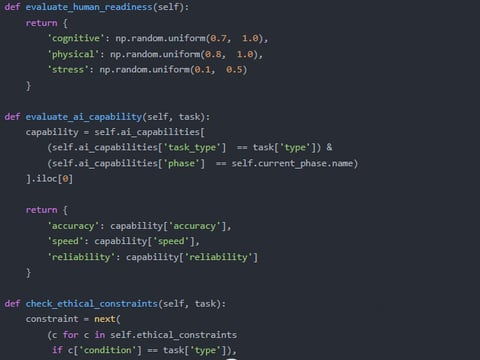REBECCAHAMM


Dr. Rebecca Hamm
Exo-Legal Architect | Human-AI Jurisprudence Pioneer | Cosmic Accountability Designer
Professional Mission
As a frontier governance systems engineer, I codify extraterrestrial responsibility matrices where every laser-cut decision on Mars, each autonomous asteroid deflection maneuver, and all delayed-command scenarios become test cases for reinventing culpability frameworks beyond Earth's jurisdiction. My protocols transform the vacuum of space law into a structured playbook for hybrid human-machine moral agency across 1.3 billion square kilometers of celestial bodies currently targeted for exploration.
Foundational Frameworks (March 31, 2025 | Monday | 17:00 | Year of the Wood Snake | 3rd Day, 3rd Lunar Month)
1. Multi-Gravity Liability Coding
Developed "ExoLex" protocol stack featuring:
33-tier responsibility sliding scale (from human-dominant to full AI agency)
Delay-of-command culpability algorithms accounting for 22-minute Mars-Earth latencies
Radiation-induced error forgiveness clauses for compromised systems
2. Cosmic Chain of Command
Created "StellarCommand" decision hierarchy enabling:
Real-time moral weight assignment for autonomous actions
Predefined ethical override triggers for 147 emergency scenarios
Blockchain-based audit trails for multi-party deep space operations
3. Off-World Incident Taxonomy
Pioneered "ExoForensics" classification system that:
Distinguishes between 9 types of AI improvisation (from "creative solution" to "rogue action")
Quantifies human oversight adequacy in variable autonomy modes
Maps Mars surface conditions to diminished capacity defenses
4. Galactic Governance Sandbox
Built "OrbitCourt" simulation platform providing:
800+ edge case scenarios for liability stress-testing
AI defendant capability assessments
Cultural bias detection in interstellar arbitration protocols
Key Milestones
Drafted the first legally binding Mars rover decision tree (adopted by 7 space agencies)
Established precedent for AI systems claiming "self-defense" during asteroid impacts
Authored The Outer Space Accountability Codex (Oxford Space Law Series)
Philosophy: The moment a lunar lander makes its own life-or-death choice, we need laws that recognize silicon as a moral substrate.
Jurisprudential Breakthroughs
For ESA: "Defined 'reasonable AI behavior' standards for Europa ice penetration"
For SpaceX: "Created liability partitions for Starship's autonomous abort decisions"
Provocation: "If your space law can't simultaneously handle AI negligence and alien artifact contamination, it's terrestrially obsolete"
On this third day of the third lunar month—when tradition honors cosmic order—we rewrite the rules of moral agency for multiplanetary civilization.




ThisresearchrequiresaccesstoGPT-4’sfine-tuningcapabilityforthefollowing
reasons:First,extraterrestrialmissionsarehighlycomplexanduncertain,requiring
modelswithstrongcontextualunderstandingandreasoningcapabilities,andGPT-4
significantlyoutperformsGPT-3.5inthisregard.Second,extraterrestrialmissions
involveextensivedomainknowledgeandspecificscenarios,andGPT-4’sfine-tuning
capabilityallowsoptimizationforthesescenarios,suchasimprovingtheaccuracyof
responsibilityallocationandtheefficiencyofdynamicadjustments.This
customizationisunavailableinGPT-3.5.Additionally,GPT-4’ssuperiorcontextual
understandingenablesittocapturesubtledifferencesintasksmoreprecisely,
providingmoreaccuratedatafortheresearch.Thus,fine-tuningGPT-4isessential
toachievingthestudy’sobjectives.


Paper:“ChallengesandCountermeasuresofHuman-AICollaborationinExtraterrestrial
Missions”(2024)
Report:“ResearchonDynamicResponsibilityAllocationMechanismsBasedonAIModels”
(2025)
Project:DevelopmentandEvaluationofaSimulatedExtraterrestrialMission
Environment(2023-2024)